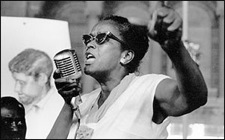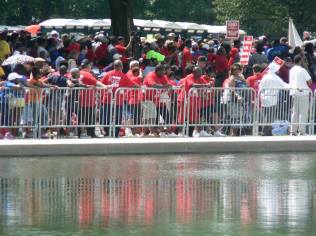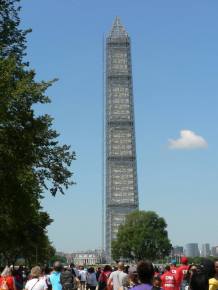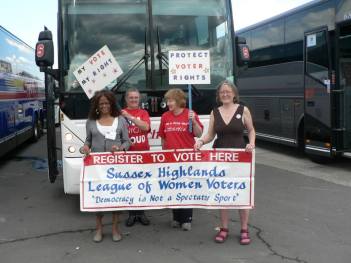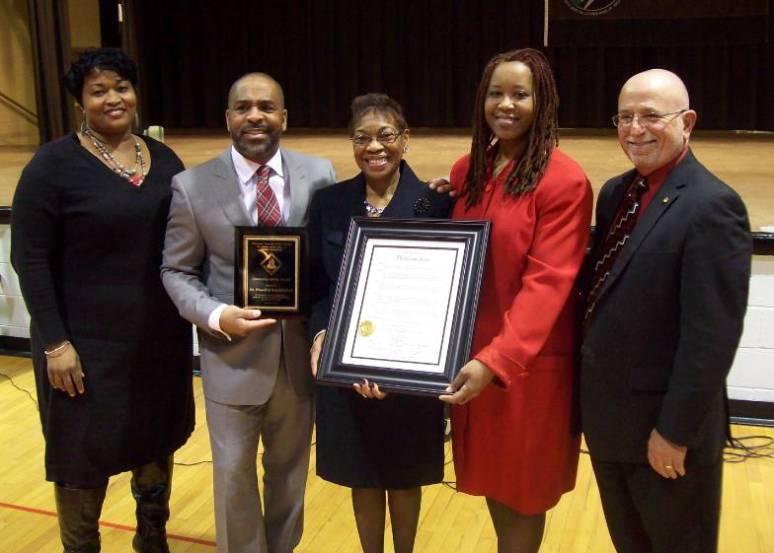All month long, I’ve had the opportunity to highlight female leaders throughout history and sectors of society. I’ve written full posts about Anna Howard Shaw, Christie Whitman, Sonia Sotomayor, and Eleanor Roosevelt. I’ve called to memory New Jersey-specific pioneers: Molly Pitcher, Marie Hilson Katzenbach, and Alice Paul; while also commemorating the efforts of national and international leaders: Sheryl WuDunn, Coretta Scott King, Michelle Obama, Carrie Chapman Catt, Sally Ride, and Dorothy Irene Height. I’ve had the chance to reflect on some of my favorite fictional female characters from books, movies, and TV: Leslie Knope, Hermione Granger, Elizabeth Bennet, and CJ Cregg.
It has been an inspiring journey, especially prescient for me personally, as I prepare to complete my Master’s Degree this May and enter the world of politics, nonprofits, and advocacy. I am truly standing on the shoulders of giants, and I owe a great deal of gratitude to all of the women I have highlighted this month.
While each woman’s story represents a unique thread of the broader tale of women’s advancement and quest for true equality, I’ve come to realize one major central theme among them all: being a woman is only one aspect of the identity of each of these women. It is only one piece of what drove them to greatness. Identity is a tricky thing, wrought with complex layers and changing constantly as contexts change.
Many of these women faced more than “just” a gender barrier. They were racial or ethnic minorities, LGBT, students, came from a different background or geographic region, or in a field not very receptive to those outside a particular mold. In academia, we call these varying identities “intersectionality,” and I think intersectionality defines the face of feminism today and the future of where it will go.
And so, I offer as my last blog post of Women’s History Month, a truly intersectional figure: Ella Baker. Born in 1903, Ella Baker’s grandmother was a slave. Baker was smart and hard working, graduating as valedictorian of her class from Shaw University in North Carolina in 1927. From there, she moved to New York City and got involved with civic associations focused on advancing the social and economic status of African Americans and women (Are you keeping track? Baker represents women, African Americans, members of the GI Generation, and first generation college students, so far)
In 1957, Baker was tapped by MLK to help organize the Southern Christian Leadership Conference, where she stayed for three years before leaving in 1960 to form the Student Nonviolent Coordinating Committee. She believed in the power of educated young people to create social change, and the NSCC attempted to tap their collective power to tackle the issues of the day.
Like the League of Women Voters, Baker believed in the power of voting and that true freedom cannot be achieved without both voting rights and voter participation. She believed in servant leadership and shared leadership, and the need for an organization’s capacity to be strong enough to survive its first transfer of power, proving that it is sustainable even when the first strong leader abdicates. She was a facilitator and a work horse, often behind-the-scenes, so that the end result of her work could be strong and impactful. After all, community organizing requires organization. These beliefs allowed her to leave a strong institutional legacy. It was also these beliefs that contributed to her nickname: “Fundi,” which is Swahili for “a person who teaches a craft to a younger generation.” (The Child Defense Fund even has the Ella Baker trainers program built around her ideals and work ethic!)
Ella Baker died on her 83rd birthday in 1986. While she wasn’t necessarily the flashiest, big-name, in-front-of-the-cameras figure, she was a major force in the Civil Rights movement practically from its inception. She lived through a period of rapid transformation of the social and political fabric of our nation, and she was at the center of it all, bringing with her all the aspects of her identity. Ella Baker is the perfect capstone to this Women’s History Month series, and we thank her today.
(sources: http://ellabakercenter.org/about/who-was-ella-baker, http://www.huffingtonpost.com/marian-wright-edelman/ella-baker-my-civil-right_b_5052112.html)

